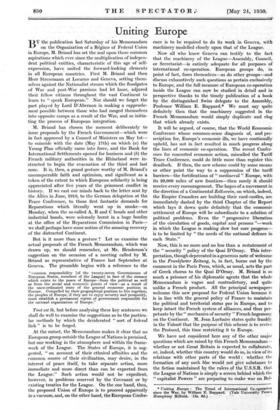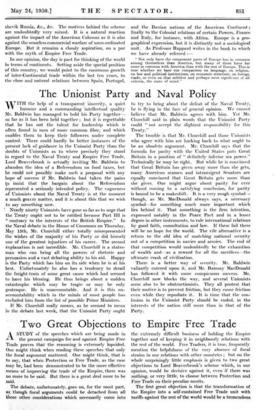Uniting Europe
M. Briand has chosen the moment deliberately to issue proposals by the French Government—which were in fact approved by a Council of Ministers on May 1st to coincide with the date (May 17th) on which (a) the Young Plan officially came into force, and the Bank for International Settlements opened for business and (b) the French military authorities in the Rhineland were in- structed to begin the evacuation of the third and last zone. It is, then, a grand gesture worthy of M. Briand's unconquerable faith and optimism, and significant as a token of the extent to which European solidarity is being appreciated after five years of the grimmest conflict. in history. If we cast our minds back to the letter sent by the. Allies in June, 1919, to the German delegation at the Peace Conference, to those first fantastic demands for Reparations which literally went up in smoke—on. Monday, when the so-called A, B and C bonds and other industrial bonds, were solemnly_ burnt in a huge bonfire at the office of the Reparations Commission in Paris— we shall perhaps have some notion of the amazing recovery of the distracted Continent.
But is it more than a gesture ? Let us examine the actual proposals of the French Memorandum, which was drawn up, we should remember, at Mr. Henderson's suggestion on the occasion of a meeting called by M. Briand as representative of France last September -at Geneva, The preamble begins with a reference to the "common responsibility [of the twenty-seven Governinents of European States, members of the League] in face of the menace which exists to the peace of Europe—from the. political as well as from the social and economic points of view—as a result of the unco-ordinated state of the general economic position in Europe. Compelled by their geographical position to live together, the peoples of Europe, if they are to enjby security and prosperity, must establish a permanent regime..of government responsible for the rational organization of Europe."
Tout est la, but before analysing these key sentences we shall do well to examine the suggestions as to the particu- lar methods by which the desiderated " sort of federal link " is to be forged.
At the outset, the Memorandum makes it clear that no European group outside the League of Nations is premised, but one working in the atmosphere and within the frame- work of the League. The States of Europe, it is sug- gested, " on account of their ethnical affinities and the common source of their civilization, may desire, in the interest of peace itself, to take separate action, more immediate and more direct than can be expected - from the League." Such action would - not - be - expedient, hoWever, in problems reserved by the Covenant- or by existing treaties for the League. On the one hand, then, the proposed -Union of Europe is to proceed apparently in a vacuum, and, on the other hand, the European Confer- ence 'is to be required to do its work in Geneva, with machinery modelled closely upon that of the League.
Now all who know Geneva can testify to- the fact that the machinery of the League—Assembly, Council, or Secretariat—is entirely adequate for all purposes of international co-operation. European groups do, in point of fact, form themselves—as do other groups—and discuss exhaustively such questions as pertain exclusively to Europe, and the full measure of European co-operation inside the League can now be studied in detail and in perspective thanks to the timely publication of a book by the distinguished _ Swiss delegate to the Assembly, Professor William E. Rappard.* We must say quite definitely then that the machinery suggested in the French Memorandum would simply duplicate and clog that which already exists.
It will be argued, of course, that the World Economic Conference whose common-sense diagnosis of, and pre- scription for, Europe's economic ills, we have continually upheld, has not in fact resulted in much progress along the lines of economic co-operation. The recent Confer- ence for concerted economic . action, miscalled the Tariff Truce Conference, could do little more than register this deadlock. If then, the new scheme could by some means or other point the way to a suppression of the tariff barriers—the fortifications of " mediaeval " Europe, with its 20,000 miles of new frontiers—then surely it should receive every encouragement. The hopes of a movement in the direction of a Continental Zollverein, on which, indeed, the Empire Crusaders are building their card-castles, are immediately dashed by the third Chapter .of the Report which lays it down quite definitely that the economic settlement of Europe will be subordinate to a solution of political problems. - Even the " progressive liberation of the circulation of goods, capital and persons "—work in which the League is making slow but sure progress= is to be limited by " the needs of the national defence in each State."
Now, this is no more and no less than a restatement of the " security " policy of the Quai D'Orsay. This inter- pretation, though deprecated in a generous note of welcome in the Frankfurter Zeitung, is, in fact, borne out by the comment in the Paris Press, which, as usual, acts the part of Greek chorus to the Quai D'Orsay. M. Briand is so much a prisoner of his diplomatic agents that the whole Memorandum is vague and contradictory, and quite unlike a French product. All the principal newspapers welcome this new proposal for Federal Union because it is in line with the general policy of France to maintain the political and territorial status quo in Europe, and to keep intact the French system of alliances, and thus per- petuate by the " mechanics of security " French hegemony on the Continent. M. Jean Luchaire states quite frankly in the Vo/onte that the purpose of this scheme is to revive the Protocol, this time restricting it to Europe.
We have not considered here any of the other major questions which are raised by this French Memorandum-- whether or not _Great Britain is expected, to collaborate, or, indeed, whether this country would do so, in view of its relations with other parts of the world : whether the formation of any such bloc would not give substance to the fiction maintained by the rulers of the U.S.S.R. that the League of Nations is simply a screen behind which the " capitalist Powers ", are preparing to make war on Bol- - .* Uniting Europe : The Trend .of International Co-operp,tion since the War, by William- E. "Raliparil: -(irale University Preg
Humphrey Milford. :13s. 6d.) - • - '
shevik Russia, &c., &c. The motives behind the scheme are undoubtedly very mixed. It is a natural :reaction against the impact of the American Colossus as it is also against the senseless commercial warfare of unco-ordinated Europe.- But it remains a cloudy aspiration, on a par with the myth of. Empire Free Trade.
In our opinion, the day is past for thinking of the world in terms of continents: Setting aside the special position of this- country, we would point to- the enormous growth of inter-Continental trade within the last ten years, to the close and natural relations between Spain, Portugal; and the Iberian nations of the American Continent ; finally to the Colonial relations of certain Powers, France and Italy, for instance, with Africa. Europe is a geo- graphical expression, but it is distinctly not a sociological unit. As Professor .Rappard writes in the book to which we have already referred :- " Not only have the component parts of Europe less in common among themselves than America, but many of them have far more in common with America than with the rest of Europe. This is true whether we bas4 our comparison on language, on religion, on law and political institutions, on economic structure, on foreign trade, or even on that subtlest and perhaps most significant of all criteria, the state of mind."







































 Previous page
Previous page